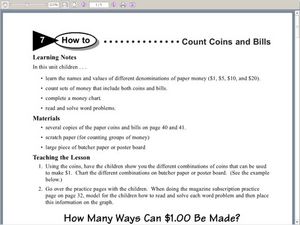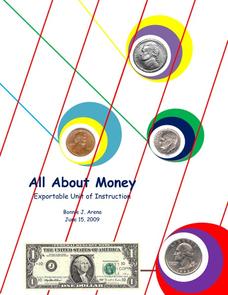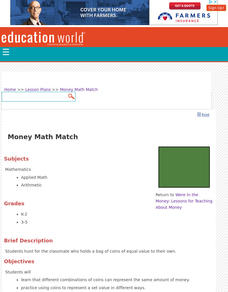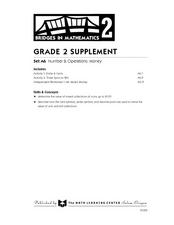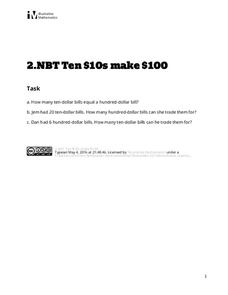Curated OER
Count Coins and Bills
Lower graders recognize coins and paper money and understand its value. They participate in a variety of money problems to appreciate the value of money. Students add, subtract, chart and solve money problems.
Curated OER
All About Money
Few topics engage young mathematicians as much as learning about money. Through a series of shared readings and hands-on activities, children explore the US currency system, learning how to count money and calculate change as they create...
Curated OER
Money
Converting money is both practical and an excellent gateway into future math concepts, and scholars get plenty of practice here! There are four sections, each with 12 values for them to convert. First, they change cent values into...
Curated OER
The Value of Coins
How much is a penny, nickel, dime, and quarter worth? Learners count and make various coin variations that equal a given denomination. Each slide contains images and explanations on how one should count coins to add them up.
Curated OER
Estimating Differences of Money
When it comes to money math, show scholars that estimation is their best friend. They round money values to the closest dollar, 10 dollar, and 100 dollar increments, solving 19 addition and subtraction problems with approximate answers....
Curated OER
Money Math Match
Students hunt for the classmate who holds a bag of coins equal in value to theirs, study that different combinations of coins can represent the same amount of money and practice using coins to represent a set value in different ways.
Carstens Studios
Math Doodles
Discover the joy and excitement of improving your math fluency through four different puzzles. Combine those with 25 different ways to represent numbers and you have hours of enjoyment that can be fun outside of the classroom as well.
Math Learning Center
Grade 2 Supplement Set A6 – Number and Operations: Money
Young scholars get familiar with money during this series of engaging math activities. A game has class teams accumulating money and using symbol and number cards to display their total amount correctly on a pocket chart. All the symbol...
Curated OER
Money Math Carnival
Third graders explore money in a carnival format. For this money lesson, 3rd graders create a carnival of mathematics activities. Students determine the value of money in mixed amounts and explore how to create representations of money.
Illustrative Mathematics
Ten $10s Make $100
If ten $10s make $100, then how much money do twenty $10s make? Young bankers find the number of bills required to make base ten amounts in three different word problems.
Eduplace
Challenge: Find the Value
This assignment makes a lot of cents! Learners write the multiplication equation to figure out what the amount of nickels are worth and then find the value. They complete three problems and one short-answer problem. An answer key follows...
DK Publishing
Money Word Problems #1
Having money problems? How about 19 more? Scholars begin with 10 money-related word problems, some requiring they understand different coin values. They add and subtract for these, and although there are also opportunities for division...
CK-12 Foundation
Expected Value: Game of Chance
Determine whether the payoff is worth it. Pupils calculate the expected value of a game with three different payoff levels. Each level has a different probability of winning money. The scholars find the expected payoffs for each...
Curated OER
Identify Coins
Kill two birds with one stone (as they say). Your class can practice problem solving skills, basic addition and subtraction, as well as work on coin values. This learning exercise includes six money related word problems to solve.
Curated OER
Dollars and Cents Word Problems
Explore money math with these addition and subtraction word problems. Learners solve three scenarios, each of which is illustrated for visual learners. They use knowledge of different types of US currency to determine how much money is...
Curated OER
Equal Value
Which coins add up to these values? Young mathematicians examine five cent values, circling the coins needed to amount to them. Next, they compare money values in four sets of coins. First, learners add up each set to find the total...
Curated OER
Adding Money
Show young economists that adding money is just like adding the numbers they are used to. They complete two addition tables, adding monetary values under 50 cents. There are a couple done for them to give guidance, but learners must...
Curated OER
Identifying Coins and Their Value
Use the special Tennessee State Quarter as a learning tool. During this lesson, discuss why the Tennessee Quarter has musical instruments on it. You can also utilize a worksheet embedded in the plan to help your class compose a song that...
Curated OER
Money
Which coins do you need? Scholars are faced with a challenge: using only three coins they must find the exact amount needed for six items. The coins are standard US currency and are pictured at the top, however their value is not listed....
Curated OER
Counting Money
Money is always a source of interest for young mathematicians, so utilize their engagement by adding up coin values. For each set of coins (quarter, dime, nickel, and penny) scholars count up and write the total. The example has them...
Curated OER
Who Has More Money?
Coloring and money combine in this fun instructional activity! First and second graders count the amounts of money represented in each, and then color the person or animal who has the most money. They then draw the correct coins to add...
Curated OER
Working with Money
How much money do you have? Scholars add up dollars and cents to get totals for 12 visual addition problems. They look at pictures of the currency and write the total numerically (remember that dollar sign). Although the coin images look...
Curated OER
Time Value of Money
Learners evaluate the time value of money. In this economics lesson, students define inflation, interest, and the future value of money.
Elementary AMC
Earth Day Math
Take some time this Earth Day to nourish the growth of your young mathematicians with this series of task cards. Whether it's the four basic operations, place value, money, or elapsed time, these conservation-themed problems...


